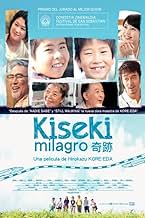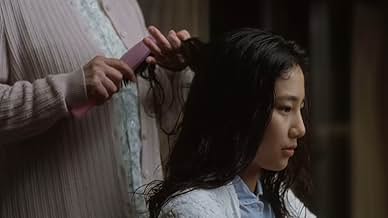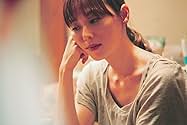VALUTAZIONE IMDb
7,3/10
8313
LA TUA VALUTAZIONE
Aggiungi una trama nella tua linguaTwelve-year-old Koichi, who has been separated from his brother Ryunosuke due to his parents' divorce, hears a rumor that the new bullet trains will precipitate a wish-granting miracle when ... Leggi tuttoTwelve-year-old Koichi, who has been separated from his brother Ryunosuke due to his parents' divorce, hears a rumor that the new bullet trains will precipitate a wish-granting miracle when they pass each other at top speed.Twelve-year-old Koichi, who has been separated from his brother Ryunosuke due to his parents' divorce, hears a rumor that the new bullet trains will precipitate a wish-granting miracle when they pass each other at top speed.
- Regia
- Sceneggiatura
- Star
- Premi
- 5 vittorie e 9 candidature totali
Kôki Maeda
- Koichi
- (as Koki Maeda)
Ôshirô Maeda
- Ryunosuke
- (as Oshiro Maeda)
Nene Ôtsuka
- Nozomi (Mother)
- (as Nene Ohtsuka)
Recensioni in evidenza
Lighthearted but profound Japanese family drama about two young brothers forced to live apart after the separation of their parents. The more sensitive Koichi (Koki Maeda) lives with his mother and grandparents in Kagoshima under the shadow of the active Sakurajima volcano, while the happy-go-lucky Ryu (Ohshirô Maeda) has remained in Fukuoka with their slacker musician father. Koichi longs for them to be reunited and when he hears of a magical rumour that when two super-fast Bullet trains pass each other they create enough cosmic energy to grant your wish, he and his friends set out to put things back the way they were.
The suburban tale of a troubled family told with a touch of fantasy and adventure draws obvious parallels with Spielberg, and it is more than worthy of the comparison. Director Hirokazu Koreeda elicits two incredibly natural performances from the boys (real life brothers) and indeed all of the young cast – in the scenes where they're hanging out he has seemingly turned the camera on some local school friends, their relationships seem so genuine. Koichi and Ryu's story is interspersed with those of their friends and family, all of whom have their own struggles and aspirations. Be it their grandfather's desire to bake a successful sponge cake, or Koichi's friend's dream of marrying the beautiful school librarian, every character – no matter how minor – is portrayed as a real person with their own hopes and fears. As a result it is constantly engrossing, establishing an affinity with everyone on screen and also allowing some fantastically warm funny moments to emerge from the characters themselves. Despite its concentration on character over narrative, and its general unpredictability, the film still has a mainstream tone and is more than capable of cultivating a wide, varied audience.
A quiet natural film that avoids obvious melodrama and sentimentality, it retains a thoughtful depth about what it is to dream and hope for that which is just out of reach. As is often the case with the most affecting cinema its power lies in what the viewer brings to it from their own lives, and how much they are willing to invest in the film. With no obvious moral or message, it has the potential to be interpreted in many ways. A philosophical yet thoroughly accessible film that effortlessly gets under the skin.
The suburban tale of a troubled family told with a touch of fantasy and adventure draws obvious parallels with Spielberg, and it is more than worthy of the comparison. Director Hirokazu Koreeda elicits two incredibly natural performances from the boys (real life brothers) and indeed all of the young cast – in the scenes where they're hanging out he has seemingly turned the camera on some local school friends, their relationships seem so genuine. Koichi and Ryu's story is interspersed with those of their friends and family, all of whom have their own struggles and aspirations. Be it their grandfather's desire to bake a successful sponge cake, or Koichi's friend's dream of marrying the beautiful school librarian, every character – no matter how minor – is portrayed as a real person with their own hopes and fears. As a result it is constantly engrossing, establishing an affinity with everyone on screen and also allowing some fantastically warm funny moments to emerge from the characters themselves. Despite its concentration on character over narrative, and its general unpredictability, the film still has a mainstream tone and is more than capable of cultivating a wide, varied audience.
A quiet natural film that avoids obvious melodrama and sentimentality, it retains a thoughtful depth about what it is to dream and hope for that which is just out of reach. As is often the case with the most affecting cinema its power lies in what the viewer brings to it from their own lives, and how much they are willing to invest in the film. With no obvious moral or message, it has the potential to be interpreted in many ways. A philosophical yet thoroughly accessible film that effortlessly gets under the skin.
If, as many have pointed out, Koreeda is Ozu's cinematic heir, then I Wish is Koreeda's take on Ozu's Good Morning. Both films focus on adorable young kids and Japanese family life, and I have no qualms about saying between the two films, Koreeda easily outdoes Ozu. Not only is Koreeda's depiction of children subtler and more intuitive (no fart jokes here), but he coaxes wonderfully naturalistic performances from his child actors. Is there a director alive who does better work with kids than Koreeda? The movie really takes flight once the kids hit the road on their quest, and I loved the Ozu-ish part where they meet an elderly couple that takes in all the children for a night. Just a wonderful movie with tons of heart. Puts the human in humanistic filmmaking.
Kouichi (Kouki Maeda) and Ryunosuke (Oushiro Maeda) who's parents are separated and now lives apart in Fukuoka, and Kagoshima hears about a rumor that if you see the meeting of the first bullet trains from Fukuoka and Kagoshima, a miracle will happen. Wishing that the miracle will be the reunion of their parents, they set out to see the meeting of the two trains, while involving their friends, teachers, and adults around them.
Child prodigy stand up comic team Maeda-Maeda performs the role of Kouichi, and Ryunosuke. Director Hirokazu Koreeda originally had a different plot for the story, where a girl living in Fukuoka, goes to see the two trains crossing each other on the track, meets a boy from Hakata and love story ensues. But upon seeing Maeda-Maeda at the audition, he changed the story to that which involves the two brothers. The project was a promotional campaign for the opening of the Kagoshima route of Japan Railways bullet train line. They brought the project to director Koreeda, and he accepted.
Very common story that involves nothing but the life of few children, but is made extraordinary by the direction of Koreeda, and the performance of Maeda brothers. Observation of people in common life, and attention to detail is extraordinary, and can only come from the eyes of a genius. I can see why Koreeda is regarded so highly as a director. I'd say only few directors can take a theme like this, and create a truly intriguing movie like this one.
In reality it is virtually impossible to pinpoint where the two trains will meet on the track, so the story is purely fictional.
It may be difficult to see all the inner workings of this movie at a first glance, but it is worth the time to sit in and really enjoy the performance.
Child prodigy stand up comic team Maeda-Maeda performs the role of Kouichi, and Ryunosuke. Director Hirokazu Koreeda originally had a different plot for the story, where a girl living in Fukuoka, goes to see the two trains crossing each other on the track, meets a boy from Hakata and love story ensues. But upon seeing Maeda-Maeda at the audition, he changed the story to that which involves the two brothers. The project was a promotional campaign for the opening of the Kagoshima route of Japan Railways bullet train line. They brought the project to director Koreeda, and he accepted.
Very common story that involves nothing but the life of few children, but is made extraordinary by the direction of Koreeda, and the performance of Maeda brothers. Observation of people in common life, and attention to detail is extraordinary, and can only come from the eyes of a genius. I can see why Koreeda is regarded so highly as a director. I'd say only few directors can take a theme like this, and create a truly intriguing movie like this one.
In reality it is virtually impossible to pinpoint where the two trains will meet on the track, so the story is purely fictional.
It may be difficult to see all the inner workings of this movie at a first glance, but it is worth the time to sit in and really enjoy the performance.
This is the story of two young Japanese brothers who live apart following the break-up of their parents' relationship. The older boy dreams of his family reuniting and prays for a miraculous intervention in the form of a volcanic eruption, hoping this might lead to his evacuation from his grandparents' region and a return home. Then, when he discovers that the passing of the speeding Bullet trains, approaching from opposite directions, creates a 'cosmic' moment during which wishes are granted, he sets out with a few friends to meet his brother at the meeting point on the railway line. There they make their wishes - with varying results.
The two brothers are forced to deal with the consequences of their parents' choices, ones they have had no part in making. Their belief, to varying degrees, in the power of 'faith' (believing that wishes can come true) then leads them to have to face the consequences of their own choices. Given their youthful immaturity, there is real poignancy in witnessing their confrontation with some harsh realities.
The movie features brilliant performances from the young actors and an excellent supporting cast of adults. There is also gorgeous and evocative cinematography, scenes of the Japanese countryside and its urban impositions, not least the Bullet line itself elevated on its concrete trackbed.
It takes some time, too long perhaps, for the story to gain momentum. But once the youngsters embark on their journey to meet the trains, the story moves at a brisker, more engaging pace. The climax (yes there is a climax, contrary to the view of another reviewer) brings moments of intense beauty and sharp sadness, regret for the loss of childish innocence of as well as optimism in the hope for a better future.
So this is a slow-burner, but persistence brings rewards. Recommended.
(Viewed at The Cornerhouse, Manchester, UK 21.02.13)
The two brothers are forced to deal with the consequences of their parents' choices, ones they have had no part in making. Their belief, to varying degrees, in the power of 'faith' (believing that wishes can come true) then leads them to have to face the consequences of their own choices. Given their youthful immaturity, there is real poignancy in witnessing their confrontation with some harsh realities.
The movie features brilliant performances from the young actors and an excellent supporting cast of adults. There is also gorgeous and evocative cinematography, scenes of the Japanese countryside and its urban impositions, not least the Bullet line itself elevated on its concrete trackbed.
It takes some time, too long perhaps, for the story to gain momentum. But once the youngsters embark on their journey to meet the trains, the story moves at a brisker, more engaging pace. The climax (yes there is a climax, contrary to the view of another reviewer) brings moments of intense beauty and sharp sadness, regret for the loss of childish innocence of as well as optimism in the hope for a better future.
So this is a slow-burner, but persistence brings rewards. Recommended.
(Viewed at The Cornerhouse, Manchester, UK 21.02.13)
As a result of their parent's separation, 12-year-old Koichi (Koki Maeda) lives in Kagoshima with his mother (Nene Ohtsuka) and grandparents (Kirin Kiki and Isao Hashizume) while his younger brother Ryunosuke (Oshiro Maeda) lives with his intermittently employed musician father (Jo Adigiri) in Fukuoka. Both talk to each other daily on their cell phone but have not seen each other in six months. Acclaimed Japanese director Hirokazu Koreeda's I Wish is a comedy/drama about the consequences of a split family and of the children's longing to reunite them. In contrast to Nobody Knows, an earlier Koreeda film about children, I Wish will not break your heart.
The brothers (brothers in real life as well) are very different in personality but both seem happy and well adjusted in spite of the difficult circumstances of their life. Ryu is fun loving and his toothless smile will warm your heart. Koichi is more serious and thoughtful but very engaging. He becomes elated when he hears that a bullet train is coming that will connect his city to his brother's. Even more exciting are the rumors that are floating around that when two trains pass each other in opposite directions, your wishes will come true out of the energy the trains create. Koichi's wish is for the nearby volcano to explode so that his family will have to move, and he will be reunited with his brother.
The plan is to meet his brother half-way and do some serious wishing. The fun starts when they have to find creative ways to raise the money. There's also the pesky part about Koichi and his two friends leaving school in the middle of the day. For this he recruits his grandfather to provide an excuse to the school authorities and includes the school librarian who once had a similar experience of wanting to escape from school to attend a concert.
The group of friends of both brothers adds a lot to the film as well. Tasuku (Ryoga Hayashi) wants to marry his teacher, a bit of magic realism there. Makoto (Seinosuke Nagayoshi) wants his dog to come back to life. Megumi (Kyara Uchida), much to her mother's indifference, wants very much to go to Tokyo and become an actress. Kanna (Kanna Hashimoto) wants to be a better painter, and Rento (Rento Isobe) wants to be a faster runner. While the focus of the film are the wishes of the group of children and their trip to the trains' midpoint, the film also provides a rounded portrait of all of its characters without syrup or other sweeteners, though it certainly views children through a somewhat rose-colored lens.
I Wish is a charming and lighthearted film, though its over two hour's length can makes the goings-on a bit tedious. Although the children arrive at the point of realizing that accepting what is can produce happiness, the growth in reaching that point is what the film is about. Ultimately, however, though hoping, wishing, and yearning are all part of childhood, some adults come to realize that, a step beyond wishing and hoping and praying for something to happen, is our ability to create, to make things happen. Unfortunately, most people have not gotten past the hoping stage.
The brothers (brothers in real life as well) are very different in personality but both seem happy and well adjusted in spite of the difficult circumstances of their life. Ryu is fun loving and his toothless smile will warm your heart. Koichi is more serious and thoughtful but very engaging. He becomes elated when he hears that a bullet train is coming that will connect his city to his brother's. Even more exciting are the rumors that are floating around that when two trains pass each other in opposite directions, your wishes will come true out of the energy the trains create. Koichi's wish is for the nearby volcano to explode so that his family will have to move, and he will be reunited with his brother.
The plan is to meet his brother half-way and do some serious wishing. The fun starts when they have to find creative ways to raise the money. There's also the pesky part about Koichi and his two friends leaving school in the middle of the day. For this he recruits his grandfather to provide an excuse to the school authorities and includes the school librarian who once had a similar experience of wanting to escape from school to attend a concert.
The group of friends of both brothers adds a lot to the film as well. Tasuku (Ryoga Hayashi) wants to marry his teacher, a bit of magic realism there. Makoto (Seinosuke Nagayoshi) wants his dog to come back to life. Megumi (Kyara Uchida), much to her mother's indifference, wants very much to go to Tokyo and become an actress. Kanna (Kanna Hashimoto) wants to be a better painter, and Rento (Rento Isobe) wants to be a faster runner. While the focus of the film are the wishes of the group of children and their trip to the trains' midpoint, the film also provides a rounded portrait of all of its characters without syrup or other sweeteners, though it certainly views children through a somewhat rose-colored lens.
I Wish is a charming and lighthearted film, though its over two hour's length can makes the goings-on a bit tedious. Although the children arrive at the point of realizing that accepting what is can produce happiness, the growth in reaching that point is what the film is about. Ultimately, however, though hoping, wishing, and yearning are all part of childhood, some adults come to realize that, a step beyond wishing and hoping and praying for something to happen, is our ability to create, to make things happen. Unfortunately, most people have not gotten past the hoping stage.
Lo sapevi?
- QuizShinkansen wanted to make a movie to promote their bullettrains. They approached Koreeda, an avid trainlover. He came up with this movie.
- ConnessioniFeatured in A Story of Children and Film (2013)
- Colonne sonoreKAGOSHIMA OHARA BUSHI
Written by Quruli
Performed by Quruli
I più visti
Accedi per valutare e creare un elenco di titoli salvati per ottenere consigli personalizzati
- How long is I Wish?Powered by Alexa
Dettagli
- Data di uscita
- Paese di origine
- Siti ufficiali
- Lingua
- Celebre anche come
- Phép Màu Giữa Đời Thường
- Luoghi delle riprese
- Aziende produttrici
- Vedi altri crediti dell’azienda su IMDbPro
Botteghino
- Lordo Stati Uniti e Canada
- 145.808 USD
- Fine settimana di apertura Stati Uniti e Canada
- 10.919 USD
- 13 mag 2012
- Lordo in tutto il mondo
- 2.371.548 USD
- Tempo di esecuzione
- 2h 8min(128 min)
- Colore
- Mix di suoni
- Proporzioni
- 1.85 : 1
Contribuisci a questa pagina
Suggerisci una modifica o aggiungi i contenuti mancanti































